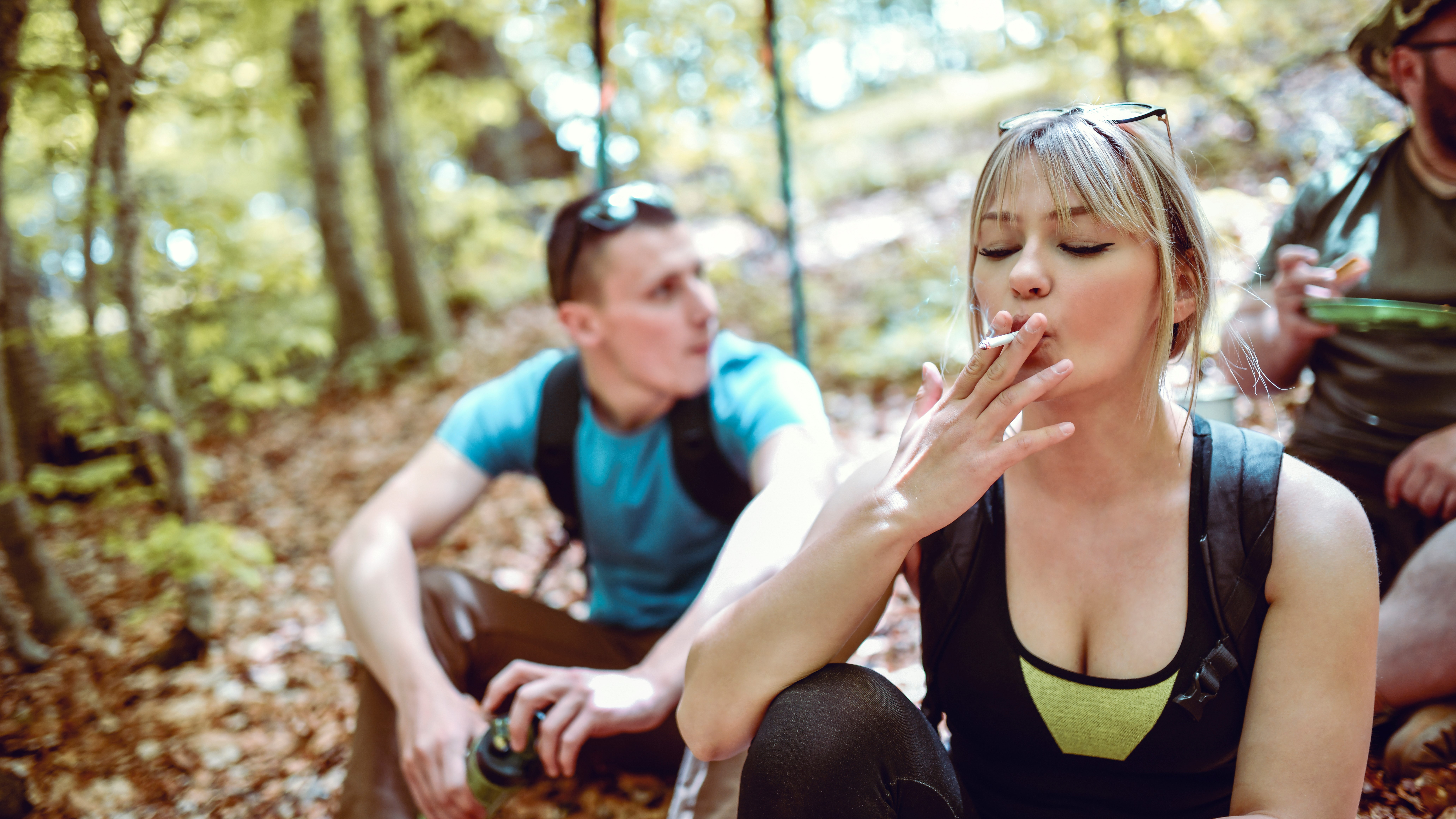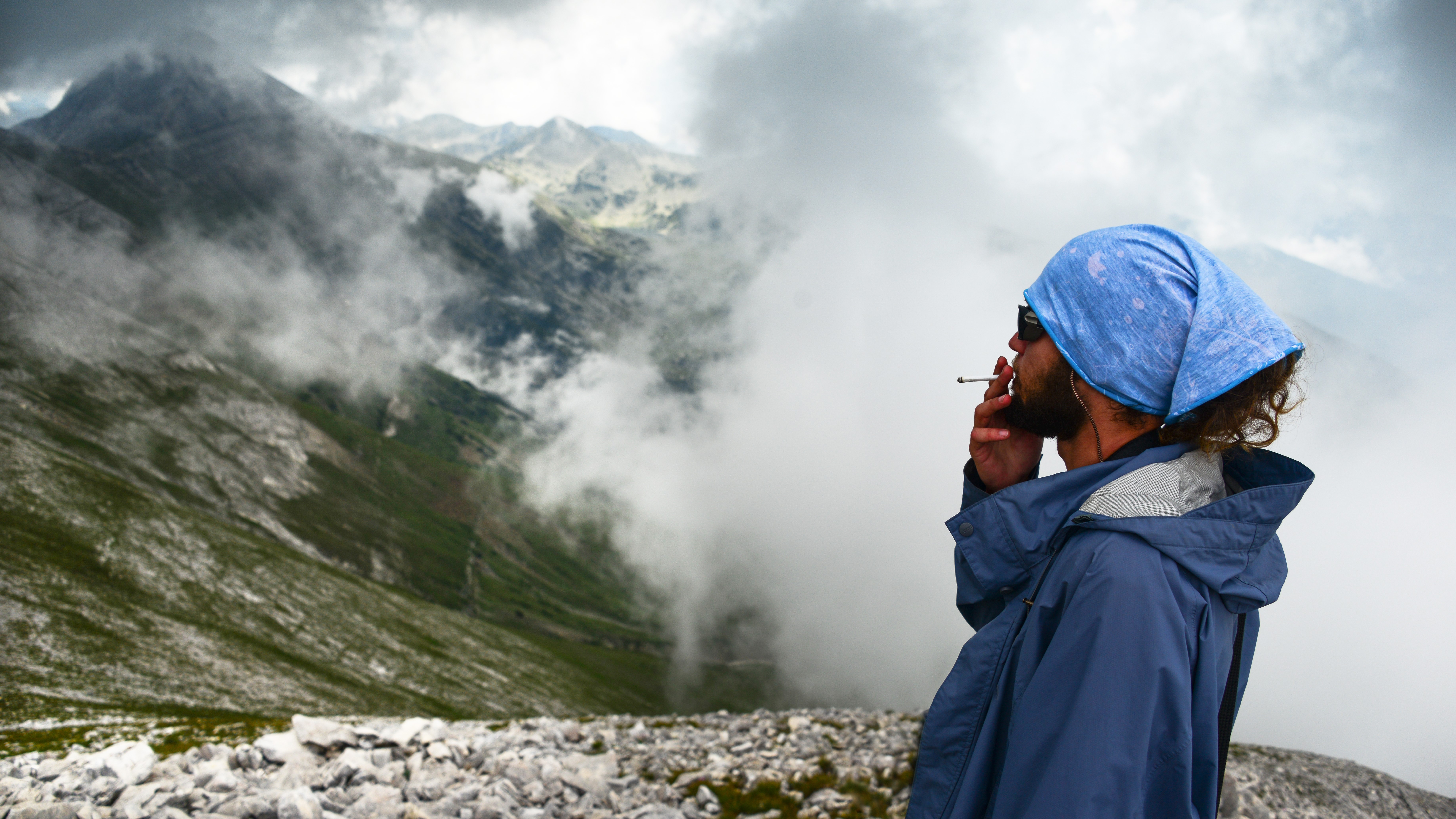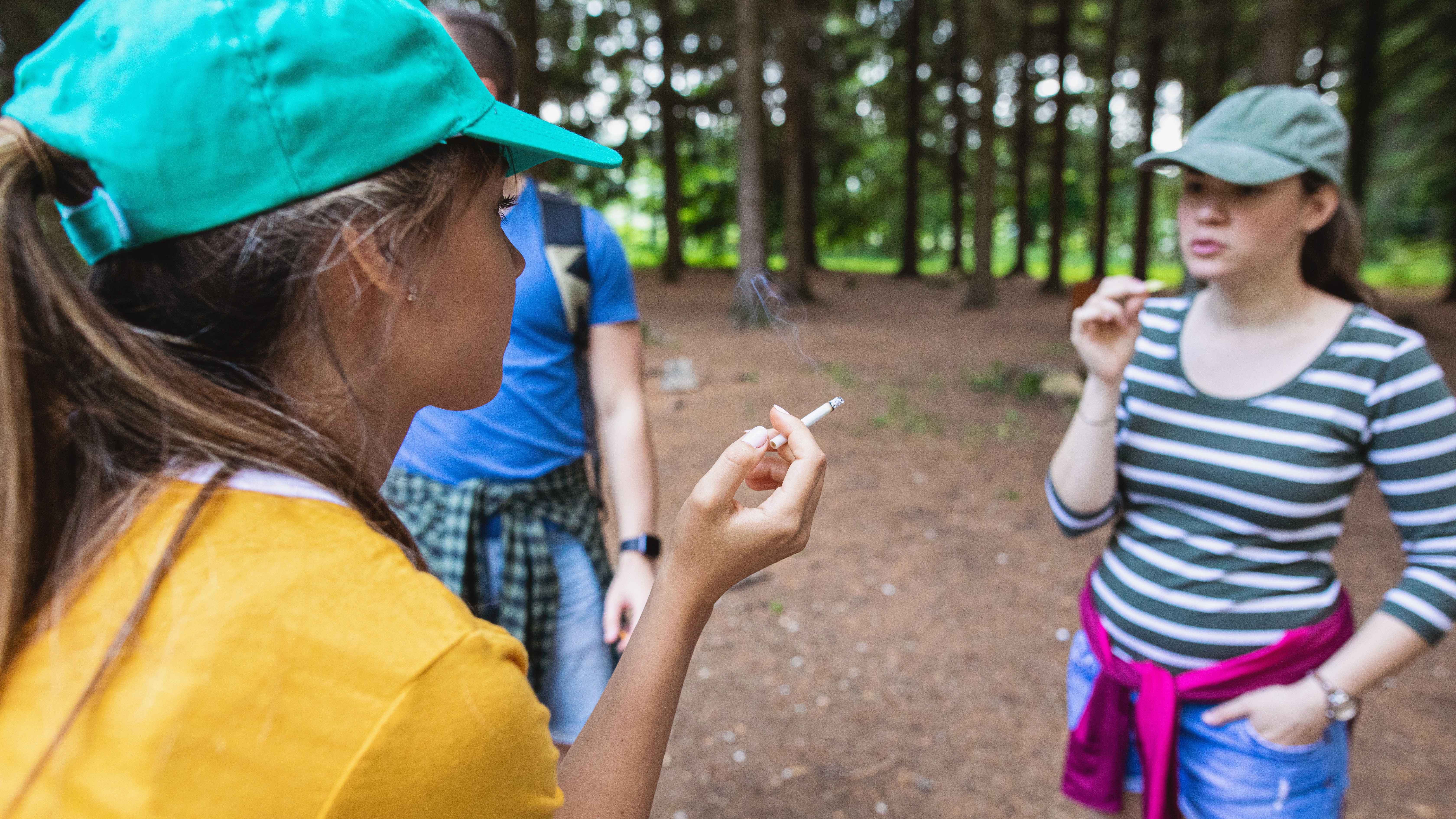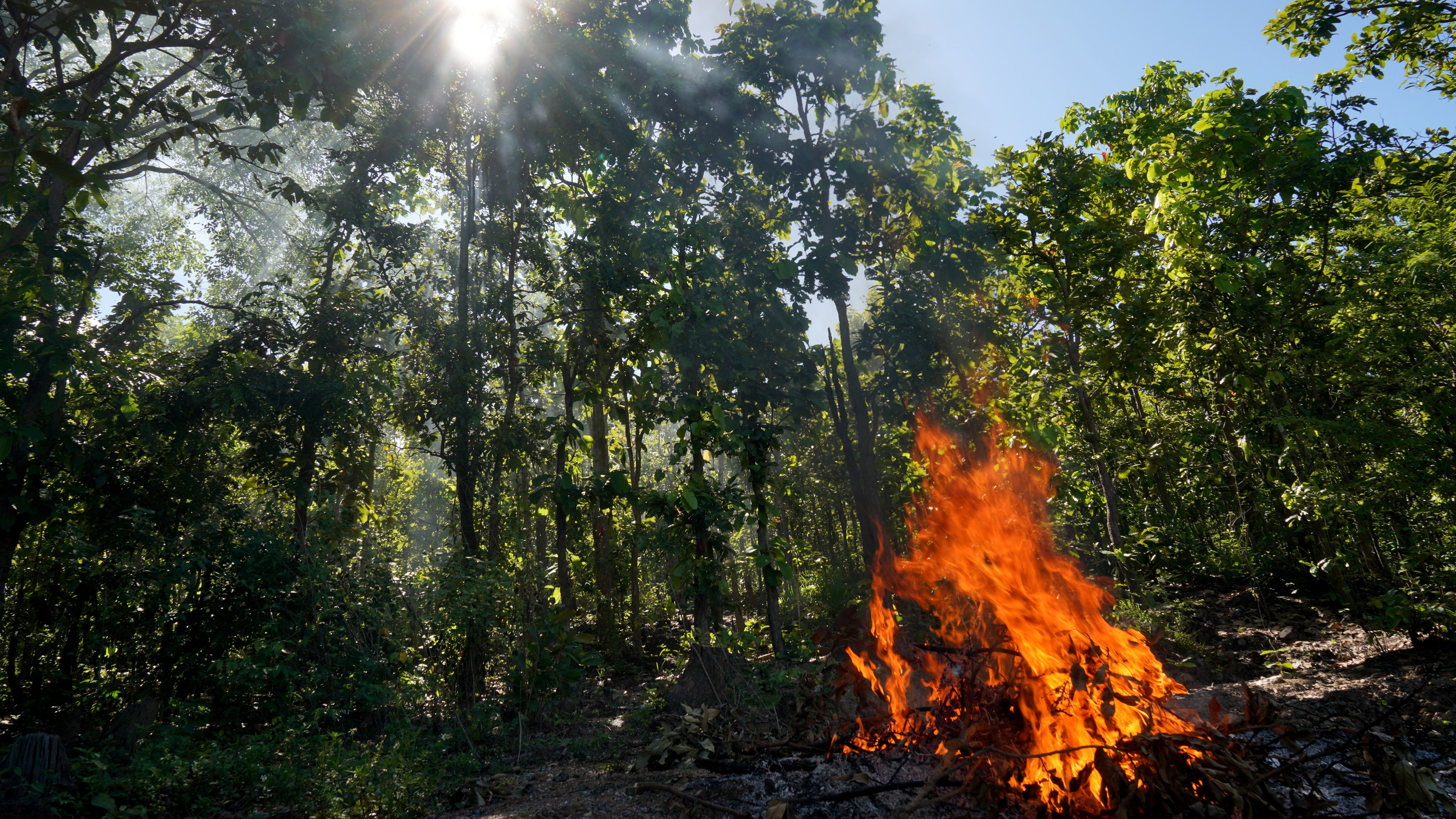Is smoking allowed on a hike?
It’s obviously unpleasant for other hikers when you spark up on the trail, but is smoking even allowed on a hike? And what can you do instead?

All the latest inspiration, tips and guides to help you plan your next Advnture!
You are now subscribed
Your newsletter sign-up was successful
Last summer, I was walking along a stretch of the West Highland Way in Scotland. That day, I was on one of the most beautiful stretches of the trail, which skirts the eastern banks of Loch Lomond. The weather was warm and I was alternating between walking and running on the undulating trail and taking wild dips in the loch to cool off. About seven miles in, I encountered something that I don’t think I’ve ever seen before on a hike – a backpacker sitting on a stile with her backpack at her feet, smoking a cigarette. Speechless, I just said hello and kept going, but I’ve been thinking about it on and off ever since.
Hiking and smoking don’t strike me as activities that typically go together, since one basically requires having a strong respiratory system and the other degrades it. It’s certainly not common, but it’s also not totally unheard of, as I recently learned hiking in the French Alps. It all got me asking a few questions, such as, is smoking even allowed on a hike? And while I’m definitely averse to cigarette smoke (and butts and reefer smoke and vape fumes) on “my” trails, are there actually good reasons for not smoking on a hike, besides annoying people?
Read on for what I’ve uncovered, and what you might want to consider if you are a smoker, but would like to get out on some adventures in hiking boots.

Is smoking allowed on a hike?
Setting aside all questions about whether or not smoking on a hike is a good idea, which it isn’t, but we’ll get to that, the unbiased answer is that it really depends on where you are. It turns out that the smoking hiker I encountered was well within her legal rights to do so, as there are no current laws prohibiting smoking on the trail or in Loch Lomond National Park, where I met her.
If you’re hiking in a lot of places in the US, however, you might actually discover that lighting up a cigarette is against the law. That’s because smoking on the trails in US National Parks is strictly prohibited, and that includes the 63 parks plus National Monuments, National Preserves, Seashores, Recreation Areas and so on. It actually covers more than 84 million acres of land, a lot of which is prime hiking real estate. Smoking (and vaping, for that matter) inside any National Park is restricted to designated areas, of which there aren’t many and none are a hiking trail. If you disregard this rule and get caught, you’ll be subject to a $300 fine.
Ok, you’re thinking, I’ll just stay out of National Parks. Well, National Forests are a little more lenient, but they still specify not to smoke while walking, and will issue a temporary ban when there’s a fire ban in place. State Park rules vary by state and on BLM land, certain states prohibit smoking outside of your vehicle
In short, depending on where you are, smoking might technically be allowed, however it can be explicitly illegal, so it’s a good idea to check before you spark up.
All the latest inspiration, tips and guides to help you plan your next Advnture!

Why is it a bad idea to smoke on a hike?
Now, moving on from the legal technicalities of smoking on a hike, you might feel nervous about going for several hours without a cigarette and think that, since you’re out in the wild, you can probably get away with having a sneaky one along the way. Let’s consider a few reasons why that’s not a good idea, even if you don’t get caught (and we’re not getting into your health here, because the label on the cigarette packet does that better than we can).
1. It's a fire risk
The most obvious, and potentially destructive reason, for not smoking on a hike is that you run the risk of starting a fire, as happened on Aspen Mountain in July, 2022. Now according to official figures, campfires are still by far the most common cause of wildfires, and while cigarettes are often to blame, they're usually from butts that have been flicked out of windows, not hikers. Fortunately, smoking is decreasing as a cause of wildfires, since less people are smoking nowadays.
However, another reason that cigarettes might not be a very common cause of wildfires is because smoking isn’t very common among hikers (though a lot of backpackers are guilty of smoking cigars at camp, while reefer smoking on the trails has gone through the roof in places like Colorado), which doesn’t mean that your individual risk level is actually lower if you’re a smoker. If you mix fire and ash with dry brush and grass, the results could always be devastating, especially during a drought.
If you’re found to have started a wildfire by careless behavior like flicking cigarette ash on a hike, you could face crippling fines or even jail time, never mind the potential loss of life that you could incur.

2. It affects wildlife – and other hikers
Where there’s a lit cigarette, there’s smoke, and that’s the last thing other hikers, not to mention the local wildlife, want to be breathing – we’re here for the fresh air, after all. What you do with your lungs is your business, but only if it doesn’t affect others. You might be certain that there’s no one else around, but the wind has a way of carrying smoke long distances and nature spots are full of non-human creatures that will be affected by the presence of smoke, as well as potential littering.
When you're outdoors, smoke doesn't just disappear into the ether. The Humane Society published research showing that your smoke can settle on the fur of mammals and the feathers of birds and leave them exposed to diseases like cancer. Basically, just like you probably wouldn’t smoke in a non-smoking friend’s house, you shouldn’t smoke in natural environments because creatures live there too.
3. It involves littering
If you’re new to hiking, you might not be familiar with the concept of Leave No Trace, but it’s essentially a basic tenet of hiking that means you leave things exactly as they were and should be adhered to at all times. You might fully intend to squash up your cigarette butt and carry it out with you (and you should, because to leave it on the ground could be very dangerous for wildlife), but you’ll still be flicking ash all over the ground, which leaves a mark even if it doesn’t start a fire.
Could you carry a jam jar, flick your ash into it and carry your waste with you? Sure, but that still doesn't address the issue of smoke in the air that animals and humans are breathing.

Can smokers be hikers?
Given that there are some really good reasons to not smoke on a hike, all this got me wondering if smokers can really also be hikers? After all, I’m a big proponent of making the trails accessible to all, assuming they respect nature, and I know that getting into hiking and running has helped some of my friends quit smoking.
I actually don’t think you should be forbidden from the trails for being a smoker, but that's because I don’t think you actually have to ever smoke on a hike just because you’re a smoker. My smoker friend Laura and I have hiked together quite a few times and she’s never lit up on a trail, so I reached out to her for this article and asked her how she does it. After all, when we meet for drinks or a meal, she always takes several smoke breaks. The answer, she says, is simple – she chews nicotine gum, knowing I wouldn’t want to come home with my hair and clothes smelling of smoke.
So, if you’re getting into hiking and you’ve got a daily habit, try a non-smoke (and non-vape) alternative, like gum. For a longer hiker, you could even rely on a nicotine patch and save your lungs for all that fresh air. This is definitely the more socially and environmentally responsible approach and allows you to experience the benefits of hiking and nature, without detracting from anyone else's experience.
Julia Clarke is a staff writer for Advnture.com and the author of the book Restorative Yoga for Beginners. She loves to explore mountains on foot, bike, skis and belay and then recover on the the yoga mat. Julia graduated with a degree in journalism in 2004 and spent eight years working as a radio presenter in Kansas City, Vermont, Boston and New York City before discovering the joys of the Rocky Mountains. She then detoured west to Colorado and enjoyed 11 years teaching yoga in Vail before returning to her hometown of Glasgow, Scotland in 2020 to focus on family and writing.

